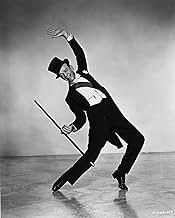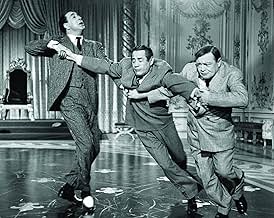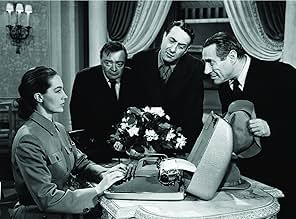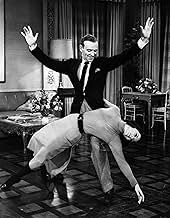Après que trois agents soviétiques maladroits aient échoué dans leur mission de récupérer un compositeur soviétique égaré de Paris, la belle et ultra-sérieuse Ninotchka est envoyée pour term... Tout lireAprès que trois agents soviétiques maladroits aient échoué dans leur mission de récupérer un compositeur soviétique égaré de Paris, la belle et ultra-sérieuse Ninotchka est envoyée pour terminer leur mission et les récupérer.Après que trois agents soviétiques maladroits aient échoué dans leur mission de récupérer un compositeur soviétique égaré de Paris, la belle et ultra-sérieuse Ninotchka est envoyée pour terminer leur mission et les récupérer.
- Réalisation
- Scénario
- Casting principal
- Récompenses
- 5 nominations au total
- Restaurant Patron
- (non crédité)
- Wife
- (non crédité)
- Soviet Guard
- (non crédité)
- Model
- (non crédité)
- Model
- (non crédité)
- Reporter
- (non crédité)
- Dancer
- (non crédité)
- Tenant
- (non crédité)
Avis à la une
A characiture of the USSR and America of the Cold War period? Yes indeed, and it was almost as good as "One, Two, Three" in its dialogue and situation. Its sensuality as presented in its dance numbers far exceeded the 1939 version and all comers of the same subject.
I had no problem watching a 56 year old Astaire romancing a 36 year old Charisse. As a matter of fact, I found the pair quite sensuous.
I have often wondered why in the final dance scene Cyd's costume skirt was switched to a cullote in the middle of the scene. The switch was not seamless as it was very noticeable.
But, all in all I give this delightful musical a rating of 8 on a 0 to 10 scale.
Dave
Fred Astaire plays his usual character, the playboy-ish bachelor, in this case a film producer, wanting to use a Russian composer's music for his new film. Cyd Charisse plays Ninotchka, the Russian woman who comes to Paris to bring back the composer and three comrades who failed to return him to his native land. As the three comrades, Jules Munshin, Peter Lorre (holding onto a chair as he dances), and Joseph Buloff are a hoot, adding good comic relief in their "Too Bad" and "Siberia" numbers. Janis Paige is a jewel as the ditzy actress hired for the new film. She radiates with Astaire in the memorable "Stereophonic Sound" number, as well as in her own hilarious "Satin and Silk".
Charisse, (whose wooden acting is OK here), is lovely as usual and has a few excellent dances, including the sensual "All of You" (with Astaire), the lively "Red Blues", and the stunning ballet where she removes her old Russian garb, for her new Parisian silks. This was the second of her two pairings with Astaire, and though this is not the gem that "The Band Wagon" is, it still sparkles nonetheless.
A clever and classy musical, with some very topical humor. Great songs by Cole Porter (with the exception of the tacky "Ritz, Roll and Rock"...a poor punch at rock and roll). Excellent use of color and the Cinemascope frame help to make this one of the last great musicals of the 1950s.
The story is based on Ninotchka, the female Soviet commissar who comes to Paris and finds romance reluctantly...and then enthusiastically. Paris is presented as a place where decadence was never more innocent and persuasive.
One of the things that seems so odd is that, for a Fred Astaire film, Astaire spends a good deal of time doing knee drops, full-length on-the-floor sprawls and athletic dance moves that limit the sophisticated and smooth Astaire style. He was 59 when he made the picture, and this might explain the relative shortness of some of the sequences. Still, while he is assured and immensely watchable (and while he can still do wonders with a cane), three major dance productions he is in just seem choppy.
Most of the songs from the Broadway show were retained and Porter wrote a couple of new ones. It's become routine with Porter to say that whatever his latest show was, the score was never one of his best. In this case, it's true. The romantic songs are great, but the topical specialty numbers just seem tired. Siberia and The Ritz Roll and Rock in particular miss the mark, in my opinion.
Astaire, as always, is first class. Charisse is easy to look at and a fine dancer. George Tobias, as a commissar in Moscow and Ninotchka's boss, gives a sly and dead-pan performance. Some of Porter's songs are very good. Mamoulian brought the film in on time and under budget. And Silk Stockings was a success with ticket buyers.
Astaire and Charisse are a team to be treasured (so wonderful together in "The Band Wagon" a few years earlier, under Minnelli's astute guidance) and all of the others listed in this film's credits are professionals of the highest caliber. Astaire has a fun solo (with a chorus of top-hatted dancers) in the "Ritz Roll 'n' Rock" number; Cyd gets to put those legendary legs to dazzlingly opulent use in the "Red Blues" production show-stopper; and even Janis Paige gets to raunch it up in an amusing example of clever Cole Porter risking something risqué (for its day) in a song about the Empress Josephine, "commonly known as Jo"! And there's that first reel number, "Stere-oh-phonic Sound," that cleverly spoofs the contemporary moviemakers' attempts to lure people from their TV sets with widescreens, sound coming from every corner of the auditorium and eye-glazing color processes. It may not be prime Porter but it's all far-and-away more fun and enjoyable than anything we're likely to get today with the threatened revival of the movie musical with barbarians like Baz Luhrmann given the directorial reins.
Le saviez-vous
- AnecdotesAfter this film, Fred Astaire effectively retired from musicals, preferring to concentrate on non-musical roles, though he would produce several musical specials for TV in the next few years. He wouldn't make another musical until La Vallée du bonheur (1968).
- GaffesIt becomes fairly obvious during the "Fated to be Mated" duet between Fred Astaire and Cyd Charisse that Charisse is wearing a skirt one moment and culottes (or flared shorts) the next. The bottom half of her costume changes on each cut of the dance when they are doing deep knee bends, and this is where the culottes show. For the upright spins and lifts, the skirt shows. The dance was obviously performed twice and edited into one sequence.
- Citations
Vassili Markovitch, Commisar of Art: I want to look somebody up. Does this office have a copy of Who's Still Who?
- ConnexionsEdited into Histoire(s) du cinéma: Une histoire seule (1989)
- Bandes originalesI've Got You Under My Skin
(1936) (uncredited)
Music by Cole Porter
Heard at the beginning as Steve and Boroff arrive at the hotel
Meilleurs choix
- How long is Silk Stockings?Alimenté par Alexa
Détails
Box-office
- Budget
- 1 853 463 $US (estimé)
- Montant brut mondial
- 9 755 $US
- Durée
- 1h 57min(117 min)
- Mixage
- Rapport de forme
- 2.35 : 1

































